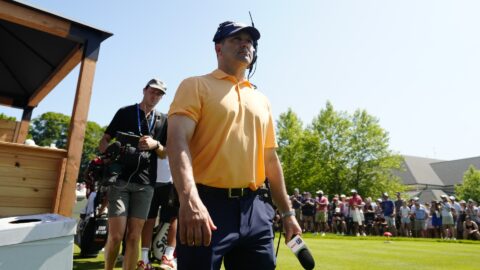 JACKSONVILLE, Fla. — The PGA Tour said Monday it would follow a new rule that bans the anchored putting stroke used by four of the last six major champions, asking instead Monday for a temporary reprieve for those who play the game for fun.
JACKSONVILLE, Fla. — The PGA Tour said Monday it would follow a new rule that bans the anchored putting stroke used by four of the last six major champions, asking instead Monday for a temporary reprieve for those who play the game for fun.
The announcement Monday after a PGA Tour board meeting is the final piece of confirmation from a major golf organization for Rule 14-1b, which will take effect Jan. 1, 2016 when the next “Rules of Golf” is published. The rule makes it illegal for players to attach the end of the club to their body would making a stroke.
Adam Scott used a long putter held against his chest when he won the Masters. Ernie Els (British Open) and Webb Simpson (U.S. Open) used a belly putter last year. Keegan Bradley in the 2011 PGA Championship was the first major champion with a belly putter.
The Royal & Ancient Golf Club and U.S. Golf Association proposed the new rule Nov. 28 and allowed for a three-month comment period. It formally adopted the rule May 21.
PGA Tour commissioner Tim Finchem said in February the tour was opposed to the new rule because there were no data to suggest an advantage and no “overriding reason to go down that road.” The tour’s opinion was shaped by a players-only meeting earlier that month.
“In making its decision, the policy board recognized that there are still varying opinions among our membership, but ultimately concluded that while it is an important issue, a ban on anchored strokes would not fundamentally affect a strong presentation of our competitions or the overall success of the PGA Tour,” Finchem said in a statement.
“The board also was of the opinion that having a single set of rules … applicable to all professional competitions worldwide was desirable and would avoid confusion.”
The decision to go along was not a surprise. The common ground by all sides was the importance of golf being played under one fundamental set of rules, as has been the case for hundreds of years.
The wrinkle that came out of the tour’s meeting was asking the R&A and USGA to give amateurs more time to adjust away from the anchored stroke. PGA of America president Ted Bishop was among those concerned that banning the stroke used for long putters would force too many people to quit the game out of frustration, at a time when golf is worried about decreasing participation.
“The policy board continues to believe that extending the time period the ban would go into effect for amateurs would be beneficial for golf participation and the overall health of the game,” Finchem said.



